Responsible
Employer
Rosenbauer has 4,130 employees worldwide, men and women who make a difference with their diversity and ideas. The company provides an environment in which every employee can contribute their talent and efforts.
DIVERSITY AND OCCUPATIONAL SAFETY
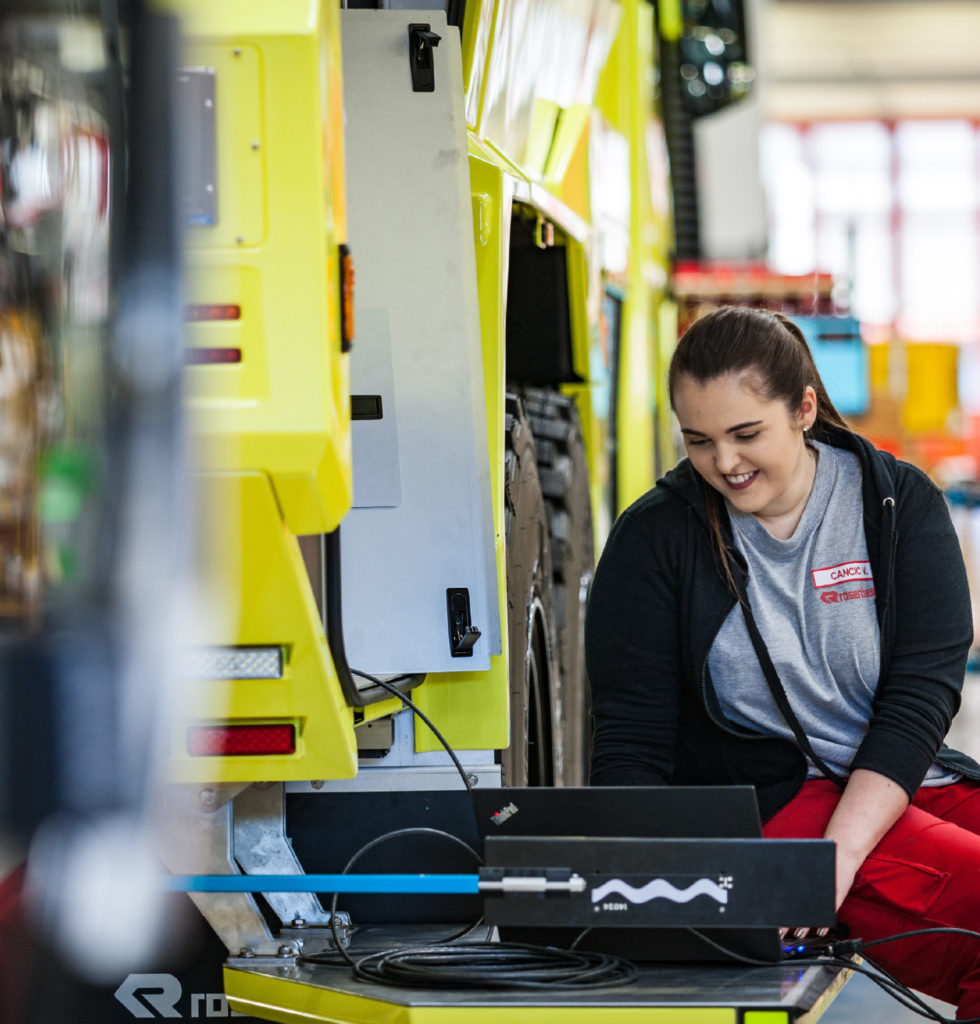

Current social and technical developments are changing the environment in which Rosenbauer and fire services operate. As a result, employees’ needs and requirements are changing. The ongoing COVID-19 pandemic in the 2021 reporting year also continued to have a significant impact on the working world. Digital networks and communications have gained in importance. In the production areas, the pandemic has put a strain on employees in the form of supply shortages and short-time working. Increased working from home has seriously changed the working conditions of office staff and demanded a great deal of adaptability from them.
HR management at Rosenbauer is the ultimate responsibility of the CEO and is coordinated globally by the Human Resource Management department at Group headquarters in Leonding (Upper Austria). At larger company locations, HR departments operate under local conditions. The departments actively exchange information to ensure the provision of training and professional development opportunities. One of HR management’s most important duties is to create a corporate culture and work environment in which employees can evolve and gladly contribute to our mutual success.
Global HR Management is tasked with monitoring success in the four material areas of activity (Training and continuing professional development, Employee satisfaction, Occupational health and safety and Diversity and equal opportunity) and reviewing this using corresponding key performance indicators.
Management of the COVID-19 pandemic
In 2021, the Group-wide crisis team again guided Rosenbauer through the COVID-19 pandemic. This coordinating committee, composed of HR Management representatives, executives, and the entire Executive Board, is responsible for global coronavirus management. Action plans were developed and modified daily to comply with national government directives, translated into various languages, and made available to all Group companies.
Working conditions at the Rosenbauer sites were modified extensively to minimize the risk of infection. In addition to offering office staff the option of working remotely and from home, shifts and work plans in Production were changed to ensure necessary physical distancing. The well-being of employees was always the top priority. When cases of infection could reasonably be suspected, employees were asked to quarantine early, even when the costs of this were not reimbursed to the company. In addition, hand sanitizer and masks were made available. These measures also contributed to keeping cases low at the sites low in 2021.
Employment structure
In the 2021 financial year, Rosenbauer had 4,130 employees worldwide – an increase of around 3.7% over the previous year. Of these, 58.8% are blue-collar workers who mainly work in production, assembly, and repair, and 41.2% are white-collar workers who work in administration, development, and sales. In the Group as a whole, only 5.9% of Rosenbauer’s employees work part-time, and more white-collar workers do so (8.4%) than blue-collar workers (4.1%). Rosenbauer supports flexible working hours, and in addition to parttime options, also offers flextime models. In the year under review, the flexitime agreement was greatly expanded at headquarters, core attendance was abolished, and break regulations were greatly facilitated, especially for part-time employees.
In order to be able to satisfy demand for employees in Production at all times, Rosenbauer also employs temporary workers. They have equal rights to Rosenbauer’s own employees and generally have the opportunity to join its permanent workforce. In the 2020 reporting period, the Group had 176 temporary employees (153 in Austria, the others in the rest of Europe). 66.1% of all Rosenbauer employees are subject to collective labor agreements.
Employment structure
The turnover rate of 13.0% was up by more than 3% compared with the previous year. The main reason for that was the turmoil in the labor market in general that the pandemic created. Of the women and men who left the company, 5.3% went into retirement, at an average age of 63.3. Not including those who were taken on as the result of acquisitions or start-ups in the reporting period, 16.3% of employees joined the Group in 2021.
Suspended or reactivated employment contracts are not included in the key figures for entries and departures, which is why slight discrepancies can occur in comparison with the total headcount.
| Employees of Rosenbauer Group by region (headcount) | All employees | Blue-collar workers | White-collar workers | ||||||
|---|---|---|---|---|---|---|---|---|---|
| 2021 | 2020 | 2019 | 2021 | 2020 | 2019 | 2021 | 2020 | 2019 | |
| Austria | 1,648 | 1,621 | 1,558 | 916 | 905 | 891 | 732 | 716 | 667 |
| Germany | 997 | 979 | 963 | 642 | 631 | 626 | 355 | 348 | 337 |
| Rest of Europe | 329 | 294 | 302 | 162 | 156 | 164 | 167 | 138 | 138 |
| USA | 985 | 911 | 829 | 619 | 638 | 597 | 366 | 273 | 232 |
| Rest of World | 171 | 179 | 176 | 90 | 94 | 116 | 81 | 85 | 60 |
TRAINING AND EDUCATION
Rosenbauer invests in its employees by offering customized training and continued professional development programs and helps them realize their full potential and contribute their skills and expertise to the company. As a result of the COVID-19 pandemic, training and professional development was converted to hybrid or virtual formats to protect employee health. This led to cost savings on the one hand and to greater international participation on the other hand. In 2021, the Group spent a total of € 600 thousand (2020: € 750 thousand) on training and continuing professional development. Training courses on specific work-related hazards are held on an ongoing basis.
Measures in this area include:
- a range of digital courses for all larger locations,
- continued professional development programs individually
adapted to the challenges of individual locations, - extensive training of apprentices, and
- the introduction of a standardized record of professional development hours.
Rosenbauer monitors the success of these measures based on the number of continued professional development hours in each employee category.
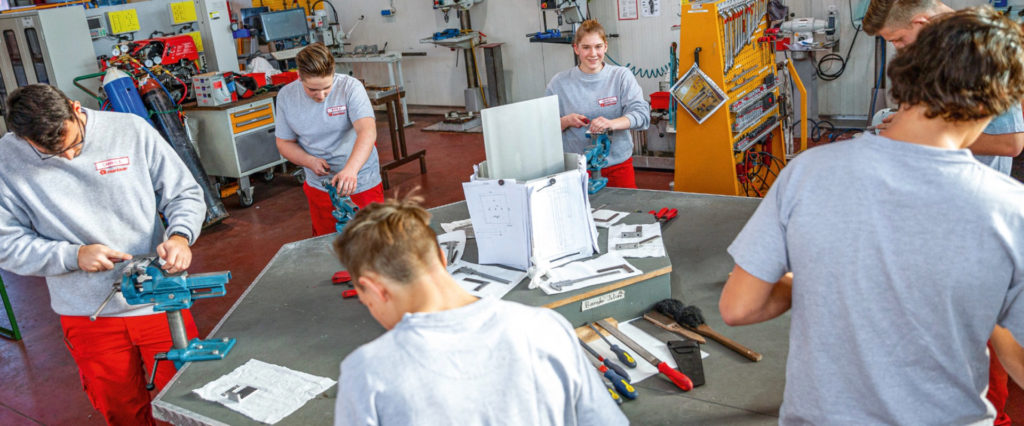
At the training workshop in Leonding, Austria, apprentices are trained in-house
Training concepts for apprentices
Rosenbauer is heavily committed to training young people and offers apprenticeships in over ten different professions. These range from industry-based management assistant to metal or mechatronics engineer. Demand for specialists is satisfied in part by apprentices trained in the company. Young people are familiarized with numerous areas of responsibility and departments during their apprenticeships. Apprentices are taught manual skills and prepared for a job in Production by experienced instructors in a dedicated teaching workshop in Leonding and at specialized schools in other locations. Training is also available in diverse subjects such as business etiquette, social skills and handling money, in order to teach young people skills that will benefit them outside the workplace, too. Sustainability issues are integrated into the training apprentices receive.
In 2021, a total of 153 young people in Austria, Germany, Switzerland and Italy served an apprenticeship with Rosenbauer, with around 77% studying technical and industrial professions and 23% administrative and commercial occupations. The two largest US locations in Wyoming (Minnesota) operate a separate training program for young employees. This provides the opportunity to receive technical training since apprenticeships are not common in the United States.
Rosenbauer also trains young people with special needs in cooperation with charitable organizations. The aim here is to integrate them into the workplace and the social structure to the greatest possible extent.
Number of apprentices at Rosenbauer 2021
Continued professional development
Rosenbauer continually invests in both professional and personal development, with the aim of preserving and fostering its employees’ qualifications and motivation. In-house and external experts offer tailored training and continuing professional development programs adapted to the working environment. At the Austrian, German and Swiss locations, courses can be booked on the company portal, which will be rolled out to other locations. Regular professional development reviews help determine employees’ needs and development goals.
In the reporting year, each employee had an average of 7.9 hours of traditional continued professional development, with white-collar workers spending approximately 9.6 hours in training and blue-collar workers 6.7 hours. However, these statistics do not take account of learning on the job, which is typical in the area of Production. Not all locations record statistics on continued professional development hours.
| Employees of Rosenbauer Group by gender (in % and headcount) | 2021 | 2020 | 2019 |
|---|---|---|---|
| All employees | |||
| Total | 242 | 202 | 193 |
| Total in % | 5,9% | 5.1% | 5.0% |
| Women | 126 | 110 | 100 |
| Women in % | 23,1% | 21,7% | 21,1% |
| Men | 116 | 92 | 93 |
| Men in % | 3,2% | 2,6% | 2,8% |
EMPLOYEE SATISFACTION
Employee satisfaction encompasses many issues that intersect and interact. Rosenbauer regularly conducts annual development reviews and uses these as a basis for determining actions to take to motivate employees for the long term. These measures are intended to address the requirements of Rosenbauer as an employer, while also meeting the needs of blue-collar and white-collar workers. These include
- targeted career planning,
- binding employment contracts, and
- benefits above and beyond regular salary.
Rosenbauer is perceived as an attractive employer, which is underscored, for example, by its employees’ long periods of employment with Rosenbauer. The success of these measures is measured according to the annual turnover rate.
Long period of employment at Rosenbauer
A long period of service with the company underscores a high degree of employee satisfaction and identification with Rosenbauer. More than 35.5% of employees at the locations in Austria have worked at Rosenbauer for more than ten years, of which 14.1% have been with the company for more than 20 years. In Switzerland, 20% of the employees have worked at the company for over ten years, while in Slovenia it is 23%.
Evaluation of mental stress in the workplace
In Austria, we are legally obligated to evaluate sources of stress in the workplace. This effort began in 2014 at Rosenbauer and was completed at all locations in Austria as part of a multi-stage process. Information about workplaces not fitting into this category and smaller units was collected in group and individual interviews. In 2021, a monitoring process was launched in which agreed measures were discussed in terms of their effectiveness and possible new measures were defined. In some business units, implementation has already begun.
Dialog and information exchange with employees
Regular performance reviews are part of responsible corporate culture at Rosenbauer and are conducted in the spirit of open and respectful dialog. Based on a discussion guide, these are held regularly between employees and their direct supervisors on a mandatory basis. In the course of these meetings the past year, performance, skills and qualifications are discussed with employees along with professional development opportunities. These discussions with employees were held at all levels at Rosenbauer again in 2021.
Promotion of work-life balance
As a responsible employer, Rosenbauer aspires to offer its employees an optimal work-life balance. This includes improving the compatibility of work and family life. Since 2015, Rosenbauer has operated an in-house daycare center for employees’ children adjacent to the Group’s headquarters in Leonding. For older children, Rosenbauer offers a summer camp during school holidays that is financially supported by the company. Rosenbauer supports flexible working hours and offers both part-time and flextime work, or work from home days. Across the Group, 5.9% of employees work part-time, with more of them in white-collar (8.4%) than blue-collar jobs (4.1%).
In Europe, a dedicated family program allows men to also take parental leave. At the headquarters in Leonding, 28 men took this opportunity in the year under review.
Occupational safety has top priority in the production of vehicles
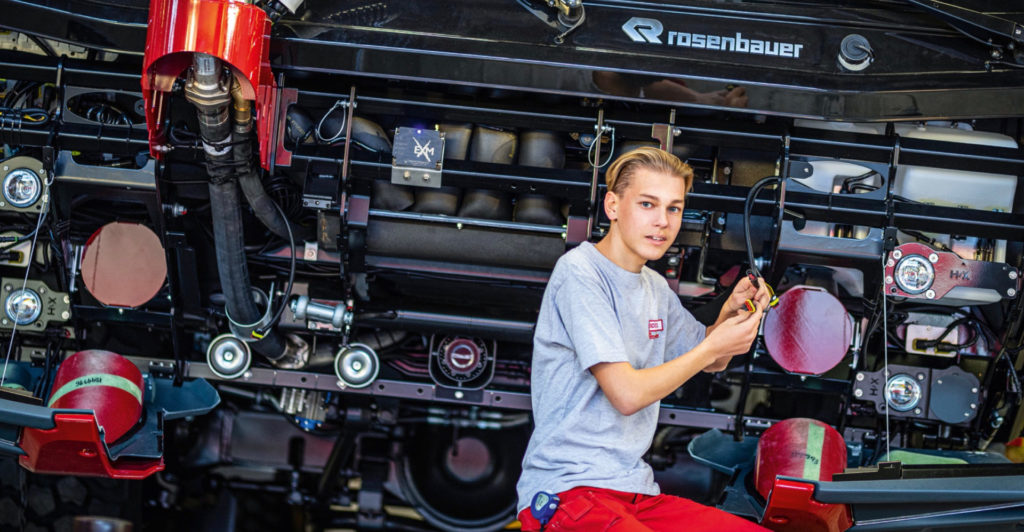
OCCUPATIONAL HEALTH AND SAFETY
Rosenbauer attaches great importance, both in Production and Administration, to providing employees with a working environment that maintains and ensures their health and well-being. Optimally protecting employees from risks and dangers during their work is a matter of particular importance to us. In this context, Rosenbauer takes the following measures:
- preventive measures to avoid mental stress,
- safety campaigns,
- providing protective work clothing,
- mandatory safety training,
- increased bonus for safety tips and ideas on accident prevention, and
- ISO 45001 certification.
Health checkups, vaccination drives, and safety and protective gear are just as standard as regular workstation evaluations. Rosenbauer is taking additional steps to promote employee health with management of reintegration into the company and the “Enable me 50+” project to provide support for employees returning from long illnesses, for example in adapting their workstations.
Key indicators in this area are the number of occupational accidents, the number of lost working days, and of sick days per employee. For the 2021 reporting year, the accident figures were adjusted to the new GRI standard. High consequence accidents, i.e. accidents with lost hours of more than six months or permanent physical or psychological damage, are now reported. Accidents involving leasing personnel are also reported separately. These were previously integrated into the total sum of accidents.
Prevention at the fore
Many occupational safety measures are aimed at prevention, and thus at reducing the number of accidents. Raising awareness among employees about potential hazards, and identifying and eliminating possible sources of hazards are important measures in this regard carried out at all locations worldwide. There is a risk of injuries with serious consequences when work is carried out on vehicle roofs, when vehicles are driven on public roads, and during maneuvering in the production halls. The issue of occupational safety is regularly discussed in team meetings.
Exoskeletons as supports for tasks involving bending and lifting
As technical supports, exoskeletons are a good tool for making physical work more comfortable and protecting employee health. As already reported, 2020 saw exoskeletons first used on a test basis at Rosenbauer as part of the research project called Enable me 50+. As one of the first areas to use support aids, Logistics (goods inward and picking) at the original plant in Leonding was chosen to use the devices in practice for the project. After successful testing, three exoskeletons were purchased in November 2021. These systems are intended to reduce the burden on employees when carrying out tasks involving bending and lifting and therefore relieve pressure on their lower back. The users received intensive training from the manufacturer of the exoskeletons and the system has been in use since then. As a result of positive feedback stating that it noticeably reduces the sensation of personal exertion, other locations are already showing a keen interest. The system has also been presented at Rosenbauer Germany in Luckenwalde already, for example. Its practical application in other potential areas is expected to be tested in the coming years.
Occupational safety – ISO 45001 certification
Due to its importance, occupational safety at Rosenbauer is firmly embedded in its organization and procedures: locations in Austria (Leonding Plant I and Plant II, Linz Plant, Asten Plant, Neidling, Graz, Telfs) and Germany (Karlsruhe, Luckenwalde), Rosenbauer Brandschutz (Leonding, Mogendorf, Gladbeck), and the Slovenian site (Radgona) are certified to ISO 45001. This means that 67.7% of Rosenbauer employees work at locations with a certified occupational health and safety management system. In addition, internal audits are carried out at all other locations. The company has set itself the goal of certifying at least three other locations by 2023, and from 2020 onward to additionally certify each new production facility according to ISO 45001.
As a rule, the Rosenbauer OHS organization consists of an occupational health service as well as safety experts, safety representatives, first-aiders, fire prevention officers, and workforce representatives. Safety teams are also present at all production locations.
Accident statistics
In 2021, a total of 265 occupational accidents occurred at Rosenbauer, of which none had serious consequences, while 107 occupational accidents resulted in more than three days’ sick leave per employee. The company set itself the goal in 2018 of reducing the accident rate to a maximum of 30 accidents per one million working hours by 2023. At 43.7 accidents per one million working hours, the accident rate fell considerably in the year under review compared with the previous year (64.6) and is already much closer to the target. The extensive package of measures already seems to be achieving good results.
As a percentage of all hours worked, those lost due to accidents amounted to 0.26%, which also represents a fall compared with the previous year. However, this is due to the fact that since the 2021 reporting year, the working hours of all employees have now been counted. Previously, only hours worked in production were reported. These occupational accidents were mainly cuts, bruises, lacerations and similar injuries when handling tools and workpieces. There were no fatal accidents or occupational accidents with serious consequences in the reporting year. Accidents involving temporary workers are included in the statistics and are also reported.
Status goal: Workplace accidents per 1 million working hours
* Due to the adjustment to the GRI standard, the number of occupational accidents fell sharply compared with the previous year.
In 2021, 31 ideas for improving occupational safety were submitted in Austria alone. Employees are informed and made aware before starting their activities – and at regular intervals thereafter – by workplace inspections, and instruction and training on safety risks and potential hazards. In 2021, 125 near-miss accidents were reported across the Group, which is three times the number compared to the previous year. This shows that the improved documentation is already yielding results.
In addition, wherever production areas are reorganized and modernized, Rosenbauer considers short routes, optimal equipment support, ergonomic access to materials, mobile tool trays and energy sources.
If occupational accidents do occur despite all precautions, they are recorded in a reporting system based on standardized specifications. The internal indicators are hours lost as a result of occupational accidents, the number of accidents itself and sick leave. Occupational accidents are reviewed with the relevant executive and safety representative. Building on this, we develop measures ranging from training to changes in workflows to prevent this type of accident in the future.
| Occupational accidents at Rosenbauer Group | 2021 | 2020 | 2019 |
|---|---|---|---|
| Work-related injuries | |||
| Employees and workers | |||
| Number | 265 | 267 | 275 |
| Occupational accidents per 1 million working hours | 43,7* | 64.6 | 63.2 |
| Leasing staff | |||
| Number | 15 | ||
| Occupational accidents per 1 million working hours | 62.5 | ||
| High-consequence work-related injuries | |||
| Employees and workers | |||
| Number | 0 | ||
| Occupational accidents per 1 million working hours | 0 | ||
| Leasing staf | |||
| Number | 0 | ||
| Occupational accidents per 1 million working hours | 0 |
* Strong reduction, as with the adjustment of the key figures the working hours of all employees are counted, not only those of the workers
Occupational health
As part of health protection and health promotion, Rosenbauer offers its employees various preventive measures. In Austria, an in-house sports association helps the workforce stay fit and covers the costs of taking part in sports events. Health programs at various locations motivate employees to choose a healthy lifestyle. The occupational physicians, psychologists, and physiotherapists play a central role in Rosenbauer’s occupational medicine efforts.
Throughout the Group, the average number of sick days per employee in the reporting year stands at 10.3 days, which equates to an increase of 0.7 days compared with the previous year and can be attributed to the COVID-19 pandemic. In Austria and Germany, employees returning from long-term sick leave are supported by a company reintegration management system taken advantage of by a majority of the affected employees. This helped 10 employees in Austria in 2021, for example.
The US locations offer a “Frequent Fitness Program” aimed at promoting health. In addition, Rosenbauer offers healthy meals and quit-smoking programs. A comprehensive fitness program for the workforce is also offered in Slovenia. This covers topics such as exercise, nutrition, tobacco and drug use, and general occupational safety issues.
No hazardous substances in production
Due to the overwhelming amount of assembly work, none of Rosenbauer’s occupational activities represent a serious health risk. Increased safety requirements exist only at those production facilities where parts are glued or painted. Naturally, all statutory regulations are complied with at these locations. Moreover, Rosenbauer has used paints free of heavy metals since 2018.
Rosenbauer wants to inspire more women to take up technical professions
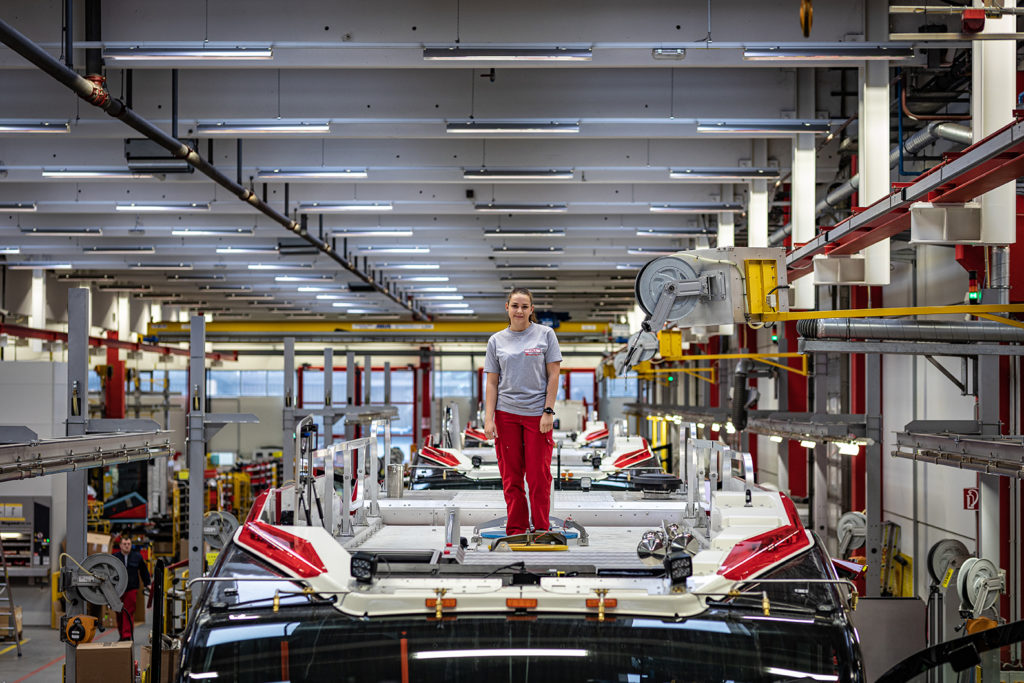
DIVERSITY AND EQUAL OPPORTUNITIES
Rosenbauer believes that a respectful and open corporate culture promotes and advances diversity. It is therefore committed to a work environment that is free from prejudice and discrimination of any kind. Employees are treated with the same respect and tolerance regardless of their gender, age, sexual orientation and identity, nationality, ethnic origin, religion and ideology. In order to make this absolutely clear to the wider world as well, the company signed the “Diversity Charter” in 2017.
In the interest of increasing diversity and equal opportunity, Rosenbauer targets the following measures:
- Introduction of a technician trainee program
- Implementation of employer branding measures
- Strengthening of female recruiting
- Group-wide establishment of the women@rosenbauer initiative.
Rosenbauer resolutely opposes any form of discrimination. Unequal treatment or discrimination can be reported to the Compliance Officer at any time. In the reporting period, one allegation of discrimination became known in Germany. Rosenbauer is endeavoring to clarify this allegation in a targeted and rapid manner.
People with disabilities make up 3.6% of the workforce worldwide. Rosenbauer works with social psychologists on their employment. What is more, several locations work with sheltered workshops.
For example, the location of Rosenbauer Italia, which has decided to enter into profitable cooperation. The external cleaning service of the service location there is run by the social cooperative SIAA (Servizi Integrazione Alto Adige). The cooperative mainly employs people who would have no chance in the local labor market. In the case of the cleaning service, it is young people with mental illnesses or who have overcome addictions. They are treated by a dedicated psychologist and have close contact with the Rosenbauer employees. At the employees’ request, the cleaning personnel even received the same Christmas present: “They should feel that for us, they belong here,” said the workshop manager Paul Horrer. The quality of the cleaning service is outstanding and the collaboration with the cooperation is going so well for all those involved that it is even being expanded. Thus the catering service of SIAA has already been engaged and the cleaning service is also to be expanded to cover certain production areas.
Status Goal Proportion of Women: achieved
A Technician for the Fire Service
She has been working in Supply Chain Management (SCM) at Rosenbauer’s Leonding location for three years and shows real enthusiasm for her role. Carina Falk-Ohrenhofer tells us about her career path, her range of tasks and attitudes to women as technicians.
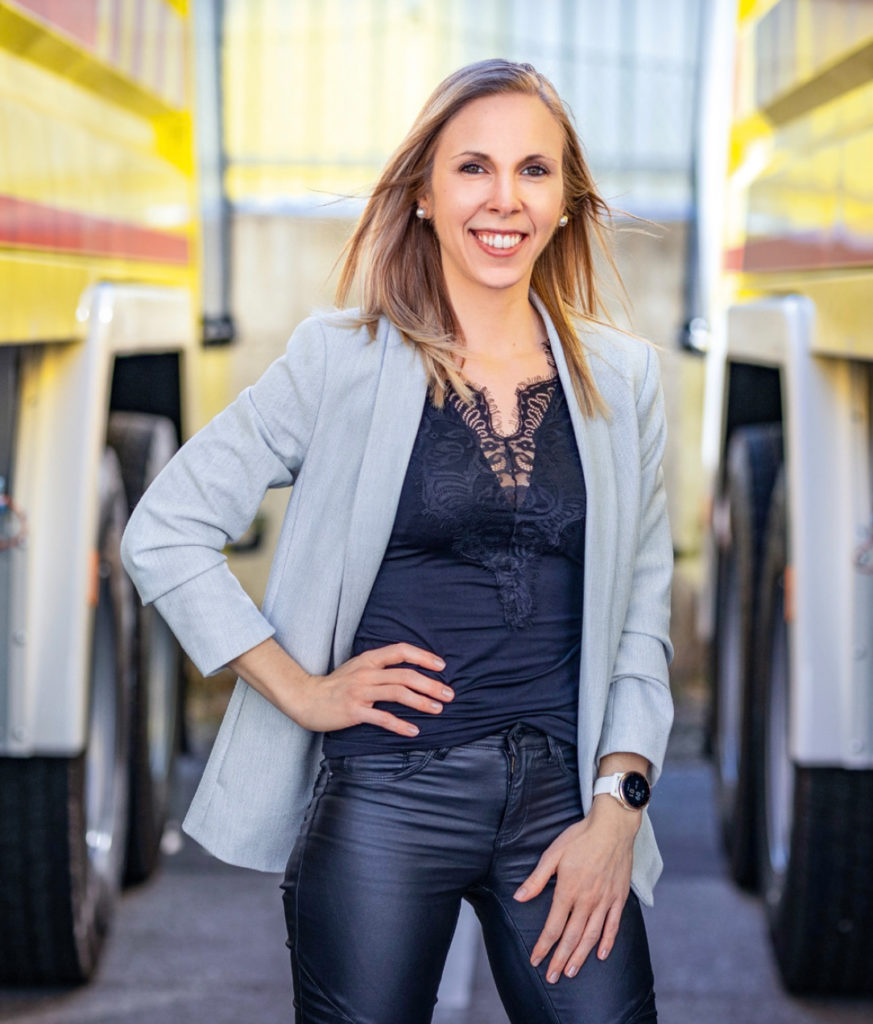
Carina Falk-Ohrenhofer hat die Logistikprozesse bei
Rosenbauer im Griff
Ms. Falk-Ohrenhofer, what is your area of responsibility? Carina Falk-Ohrenhofer: I work in Warehouse Logistics and am responsible for process and project management there.
What specific tasks do you work on? Carina Falk-Ohrenhofer: In process management, it is primarily about the ongoing optimization of our processes. For example, we have introduced a master data recording device in goods inward in order to improve the quality of data at the company. This is used to record every part as soon as it arrives in our warehouse. In the recent past, we also worked on parallelization in the picking areas. That means we have changed the method for picking from the various parts of the warehouse, the high-bay storage and the storage areas for medium-sized and small parts, from sequenced – as it had been previously – to simultaneous, which we are expecting to yield a significant reduction in the lead times for the picking process. In terms of project management, I am currently working intensively on the introduction of the new ERP system in the area of Supply Chain Management.
You have been at Rosenbauer for three years. How did you find the initial period after joining? Carina Falk-Ohrenhofer: My start to life at Rosenbauer was really exciting. The job in process management for warehouse logistics that was advertised back then appealed to me right away because it matched everything I wanted for my next job. My apprenticeship met the requirements perfectly too. So I simply applied to Rosenbauer and promptly got the job. My supervisor Markus Schallaböck, Head of Supply Chain Management at Rosenbauer, then immediately advised me to familiarize myself with my field of activity and the associated processes directly in the warehouse. That is when I knew that self-reliance and commitment are called for here. I was really pleased about that, because I have been trusted to actively help shape processes and assume responsibility from the very beginning.
Which apprenticeship did you complete? Carina Falk-Ohrenhofer: First I graduated from the vocational high school and did not want to add a traditional business degree such as business studies. In the end, an information event gave me the impetus to study industrial logistics at Montanuniversität Leoben. There they were promoting women in engineering using the slogan “Traut euch was!” (Trust yourselves to do it!)
Why industrial logistics? Carina Falk-Ohrenhofer: Logistics fascinates me because it is the ideal combination of business and engineering and is a good match for my range of interests.
What aspect of your job do you like best? Carina Falk-Ohrenhofer: The variety and the fact that I am confronted with new challenges on a daily basis. I do not just work at a desk; I frequently spend time on the shop floor, too. It is fun to work together with many different people from a wide range of areas within the company and make a difference in the process. The nicest thing of all is the positive feedback when a process change really has brought tangible added value to the everyday work of my colleagues in operations.
As a woman, how do you assert yourself with your colleagues? Carina Falk-Ohrenhofer: That is not a major issue here. Of course, you need a certain strong will to be able to win through among so many different opinions and convictions. But that applies to everyone. Being a woman plays no role in that. In any case, I have been treated in a friendly way from day one and think that the teamwork at the company is characterized by respect and that we all communicate on an equal footing.
Thank you for your time.
Equal opportunities: women@rosenbauer
Rosenbauer strives to give every employee the same opportunities – regardless of origin, age, gender, culture, or background. To promote diversity, Rosenbauer founded the women@rosenbauer initiative in 2021. The Executive Board has allocated a budget for this women’s network for the 2022 financial year, so that it can continue to be effective. The initial focus is on increasing the proportion of women in general, but especially in management at Rosenbauer International. Corresponding measures are being developed by HR together with the women’s network and implemented step by step.
As a professional field traditionally dominated by men, targeted measures are needed to promote women. women@rosenbauer aims above all at connecting female employees, mutual support and exchange. For example, several working groups have drawn up demands and measures aimed at improving the gender balance. These include more intensive support for women and men on parental leave, an internal website with information on the topic of equality, and the development of a no-go policy to improve cooperation between all employees. Another focus is on recruiting, which explicitly aims to attract more women to Rosenbauer in the future, especially in technical professions. Several measures are being supported to get girls interested in technology as early as school age.
In the recruitment process, care is taken to treat male and female applicants equally. The total percentage of women in the Group is 13.2% and is therefore 0.5% higher than the previous year.
With the launch of the women’s initiative, the targets for the proportion of women were also brought into focus. The target set for the first time of employing 540 women in the company by 2023 was achieved in 2021. Rosenbauer now aims to achieve a 15% share of women by 2025, both in the overall workforce and in the top two levels of management. The share of female executives decreased slightly, from 12.1% in 2019 to 12% in 2020. Employees with responsibility for staff at the individual locations were used for the calculation. However, the proportion of women in the Group’s highest management body is only 6%. As a manufacturer that takes on apprentices, Rosenbauer’s stated objective is to encourage girls to follow a technical career path. The percentage of young women doing an apprenticeship was 21.6% in 2021. Female apprentices in Production accounted for a share of 11%. The target of increasing the proportion of female industrial apprentices to 10% by 2023 was therefore also achieved in 2021.
women@rosenbauer
In spring 2021, the women@rosenbauer promotion of women initiative was founded with a clear mandate from the Executive Board to promote diversity in the company. In this interview, the Steering Committee of women@rosenbauer – comprising Gundel Labak, Karin Palmetshofer-Hörschinger, Janine Zika, and Vanessa Schabetsberger – explains what their biggest concerns are.
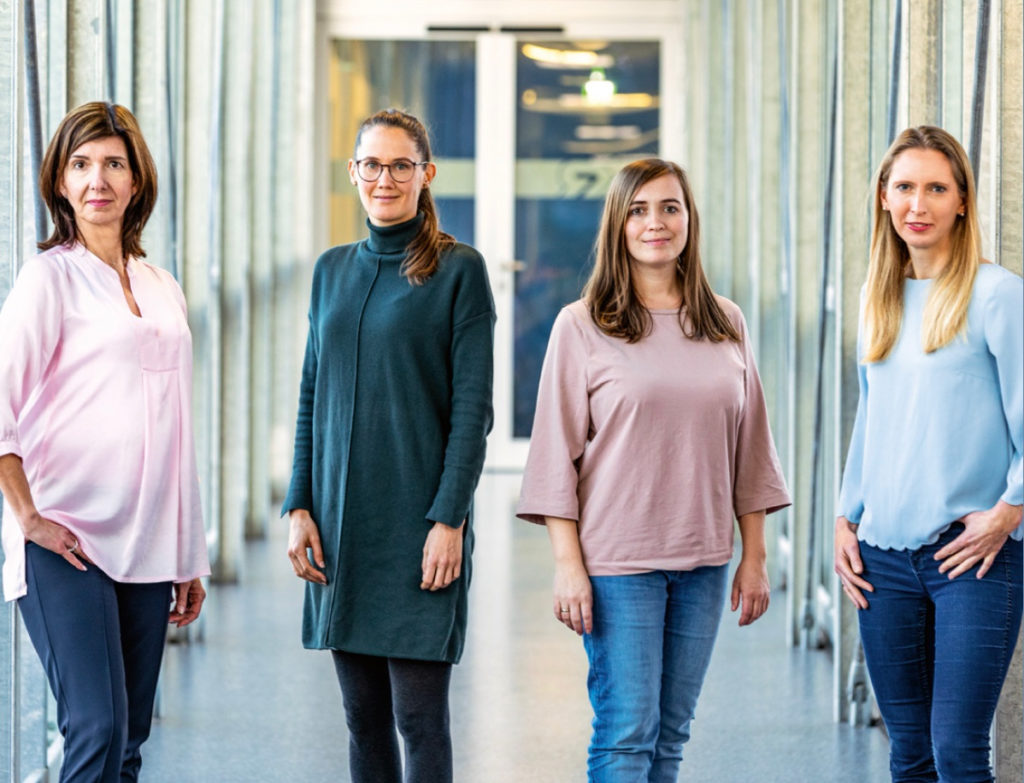
Karin Palmetshofer-Hörschinger, Janine Zika, Vanessa Schabetsberger und Gundel Labak, from left to right.
Why is it necessary to establish such an initiative at Rosenbauer, what are the challenges? Karin Palmetshofer-Hörschinger: Fundamentally, the firefighting industry – and therefore our external and internal environment – is dominated by men. At the same time, numerous studies prove that mixed teams within companies are considerably more successful. Meanwhile, the general trend toward more gender diversity is now arriving in our industry as well. We are seeing more women in the fire services, among our apprentices and among all other stakeholders in our company. In a comparison of Austrian industrial companies, we are in the lower quartile with a proportion of women of around 13%. So Rosenbauer has a lot of catching up to do. We are focusing on the women at the company and on female applicants. It is also particularly important to get male colleagues on board, because the advancement of women is not a matter for women alone, but rather for society as a whole in the interests of equal opportunities.
What are the goals of women@rosenbauer? Vanessa Schabetsberger: We have goals that can be measured using key figures and goals that should become noticeable in the corporate culture. The former are easy to explain: By 2025, we want a share of women of at least 15% – both in the overall workforce and on every level. We can manage that. The other goals are more difficult to measure, but they should have an influence on the everyday work of all colleagues. We want more women to work at Rosenbauer in senior roles and we want women to be able to increasingly have a say on important corporate topics and to feel equal. We want women at Rosenbauer to network with one another so that they can collectively celebrate their own successes and those of the company. We also want to generate and implement new ideas that arise from greater diversity. The requirements for a female firefighter are not always the same as those for a fireman.
What successes have you already been able to celebrate? Gundel Labak: We are really proud of everything that we have already achieved in just one year! Together, we have launched seven working groups that deal with topics such as maternity leave, marketing, female recruiting, key figures, and a no-go policy. These have already worked out numerous measures, some of which have been implemented. Our initiative, women@rosenbauer, has also been communicated to all employees throughout Austria by the Executive Board and been presented to management. The working groups and networking events have enabled the women from the various areas of operations at Rosenbauer to get to know one another better. More than 30 colleagues are already taking part in the initiative alongside their regular tasks. Networking at the company strengthens and motivates us women at Rosenbauer and is also great fun.
What projects are planned for 2022? Janine Zika: We have a lot planned, that’s for sure! This year we want to further expand active maternity management in Austria. Our colleagues who are at home with their children should be kept informed and should receive better support, including even more active support when they return to work. We want to create even more offerings specifically for women with the Works Council. Recruiting women is also an important focus for 2022. We want to attract lots of new female colleagues to Rosenbauer and, at the same time, are taking part in exhibitions and events that are intended to get young women interested in technology. One of our most important goals for this year is extending women@ rosenbauer to the DACH region. Our subsidiaries in Germany and Switzerland should also profit from the women’s initiative. Of course, we plan to roll it out across the entire Group in the long term. However, numerous country-specific requirements need to be observed in the process. So 2022 is sure to be anything but boring.